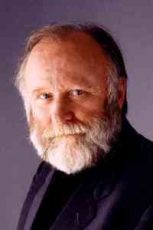 Frank Herbert, author of Dune and other works, in conversation with Richard Wolinsky, Lawrence Davidson and Richard A. Lupoff, recorded July, 1981 at Westercon in Sacramento.
Frank Herbert, author of Dune and other works, in conversation with Richard Wolinsky, Lawrence Davidson and Richard A. Lupoff, recorded July, 1981 at Westercon in Sacramento.
During the July 4th weekend of 1981, the Probabilities crew, Richard Lupoff, Lawrence Davidson and Richard Wolinsky, went to the Westercon Science fiction convention in Sacramento.
One of the guests that weekend was Frank Herbert. By that point, he’d written several novels, including what had become known as the Dune trilogy – Dune, Dune Messiah, and Children of Dune. Earlier that year, a sequel to the trilogy had been published, God Emperor of Dune.
The three managed to corral the author for an interview that lasted, including some socializing, to just under a half hour. Back at KPFA, it turned out that the tape had screwed up, and the final portion of the interview had speed variations that made it unlistenable. Perhaps ten minutes were aired at the time. Digitizing it in 2021, it became clear that at least some more of the interview could be manipulated sufficiently to allow listeners to follow the conversation.
The final question in the interview did not survive. Here’s what happened:
In 1977, Ballantine Books published a novel called Sword of Shannara by Terry Brooks. After reading the novel, Richard Wolinsky drew up a long list of plot points the book shared with the Lord of the Rings trilogy, so many in fact that the publisher, Judy-Lyn Del Rey, also the publisher of the Tolkien books, admitted with a nodthat any other publisher could have been sued for plagiarism. What turned Sword of Shannara into a best-seller, however, was a very positive review by Frank Herbert that appeared in the New York Times. Dick Lupoff became obsessed with the review, and how it ignored the similarities between the two books. In that final question, he asked Herbert about the review. At first, Herbert admitted that he overlooked the Tolkienesque prose style because most new authors copy others. When Dick pressed him further about the content, Herbert finally said that he had never read Lord of the Rings. After that answer, he said abruptly, “times up.”
After 1981, Frank Herbert wrote two more Dune sequels, Heretics of Dune and Chapterhouse: Dune before dying at the age of 65. After his death, his son Brian Herbert along with Kevin J. Anderson used Herbert’s notes for several other novels and one collection of short stories, which at this point stands at 15 additional books set in the universe of Dune. The chronological history of Dune concluded with Hunters of Dune (2006) and Sandworms of Dune (2007) based on Frank Herbert’s original chronology and outlines for the final books in the series.
The David Lynch version of Dune came out in 1984 and is streaming on HBO Max. The story of the Dune movie that was never made, Jodorowsky’s Dune, was released as a documentary in 2013 and can be rented on various streaming services. A new version of Dune, (first of two parts) directed by Denis Villeneuve, opens in theaters and on HBO Max on October 22, 2021.


